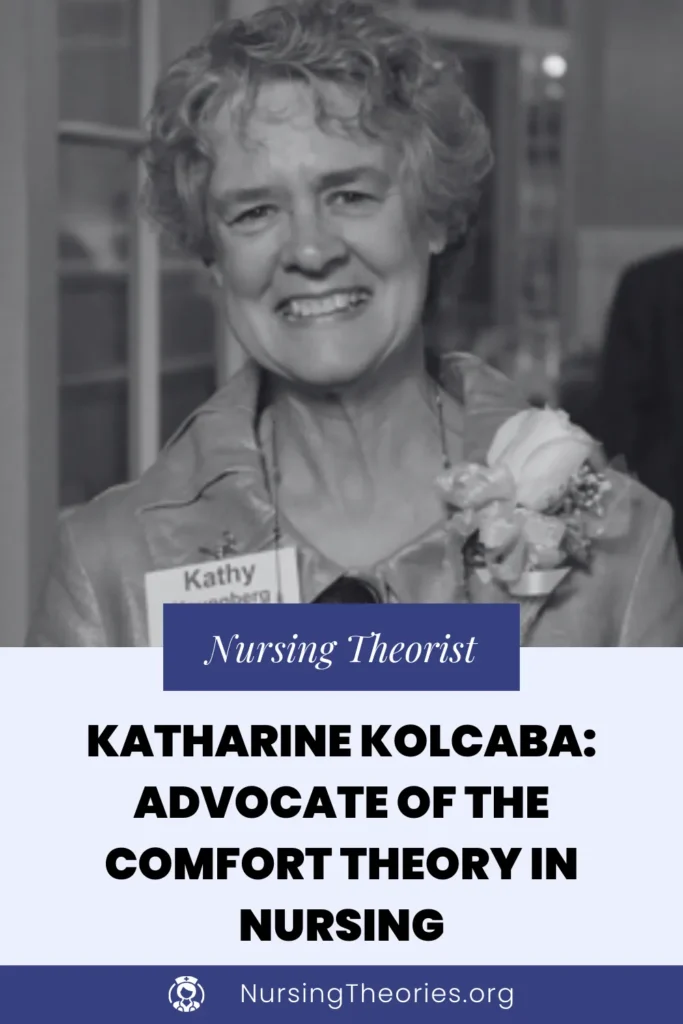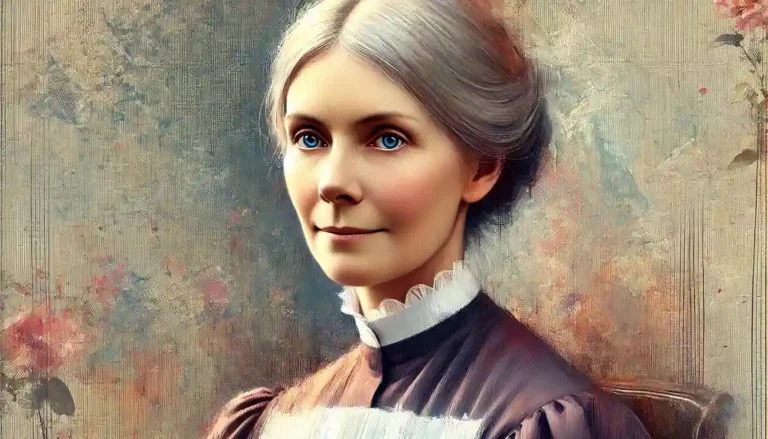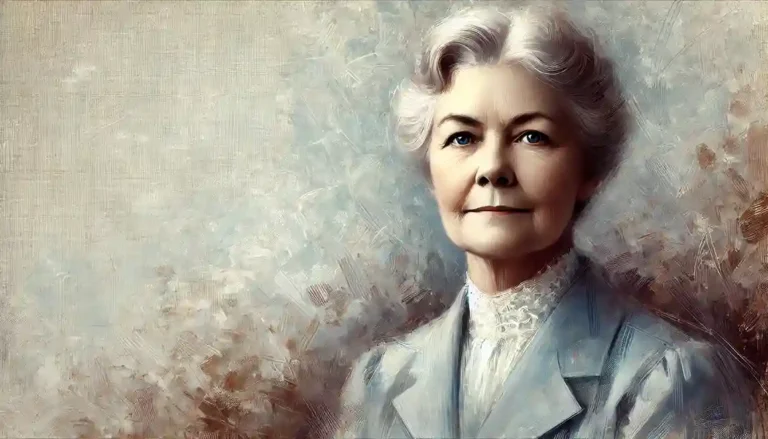Katharine Kolcaba, a respected nurse theorist and researcher, is best known for developing the Comfort Theory, which emphasizes the importance of comfort in promoting healing and overall well-being.
Her theory highlights the role of nurses in assessing and addressing patients’ physical, psychological, and environmental comfort needs.
Kolcaba’s work has profoundly influenced nursing practice by integrating comfort as a central component of holistic, patient-centered care.
In this article, we cover Katharine Kolcaba’s life, achievements, philosophy, and lasting impact on modern nursing.

Quick Summary
- Developed the Comfort Theory, which focuses on meeting patients’ comfort needs to improve health outcomes.
- Advocated for holistic nursing care that addresses physical, emotional, spiritual, and environmental well-being.
- Emphasized the role of comfort in enhancing healing, satisfaction, and patient engagement.
- Authored influential works that continue to shape nursing education and clinical practice globally.
- Recognized for her contributions to evidence-based nursing and patient-centered care.
Early Life and Background of Katharine Kolcaba

Birth and Family Background of Katharine Kolcaba
- Katharine Kolcaba was born in 1944 in Cleveland, Ohio, where she grew up in a family that valued compassion and service.
- Her early experiences of caring for family members and involvement in community activities inspired her passion for nursing.
Education and Early Influences in Kolcaba’s Life
- Kolcaba earned her nursing diploma from St. Luke’s Hospital School of Nursing and later pursued a bachelor’s degree from Case Western Reserve University.
- She completed her master’s degree in nursing with a specialization in gerontology and a doctorate focused on nursing theory development.
- Her academic background in gerontology, combined with her clinical experiences, shaped her understanding of comfort as a key aspect of patient care.
Katharine Kolcaba’s Philosophy and Vision for Nursing
- Kolcaba believed that comfort is fundamental to healing and that nurses should address patients’ comfort needs holistically.
- Her vision emphasized that when patients feel comfortable physically, emotionally, and spiritually, they are more likely to engage in the healing process.
- Famous quote: “Comfort is more than a physical state—it is a holistic experience that contributes to a patient’s overall well-being.”
Katharine Kolcaba’s Education and Early Nursing Career
Formal Education and Nursing Training of Katharine Kolcaba
- Kolcaba’s education in nursing science, gerontology, and theory development provided her with the tools to create a comprehensive model of comfort.
- Her academic work emphasized the integration of theory and practice to address diverse patient needs.
Early Professional Experiences in Kolcaba’s Career
- Kolcaba worked as a clinical nurse in various settings, including hospitals, nursing homes, and community health centers.
- Her experiences with geriatric patients and those undergoing chronic illnesses inspired her to explore the role of comfort in recovery and quality of life.
Key Achievements and Contributions of Katharine Kolcaba
Development of the Comfort Theory
- Kolcaba’s theory defines comfort as an experience achieved through the fulfillment of three types of needs:
- Relief: Meeting immediate comfort needs, such as pain management.
- Ease: Addressing emotional and environmental factors to reduce distress.
- Transcendence: Helping patients rise above challenges to achieve a state of well-being.
- The theory also identifies four contexts of comfort:
- Physical Comfort: Relates to bodily sensations such as pain relief and rest.
- Psychospiritual Comfort: Involves emotional well-being and spiritual peace.
- Environmental Comfort: Concerns external factors such as lighting, noise, and cleanliness.
- Sociocultural Comfort: Involves family support, cultural preferences, and social interactions.
Contributions to Nursing Education and Curriculum Development
- Kolcaba integrated her theory into nursing curricula, emphasizing the role of comfort in patient-centered care.
- She developed teaching strategies that focus on assessing comfort needs and tailoring interventions accordingly.
Research and Theoretical Advancements
- Kolcaba conducted extensive research on the relationship between comfort and health outcomes, providing empirical support for her theory.
- Her studies demonstrated that addressing comfort needs leads to improved patient satisfaction, faster recovery, and better engagement in treatment plans.
Global Impact and Recognition
- Kolcaba’s theory has been adopted in various healthcare settings worldwide, influencing nursing practice, education, and research.
- She has received numerous awards and honors for her contributions to nursing theory and evidence-based practice.
Overview of Katharine Kolcaba’s Comfort Theory
- The theory guides nurses in assessing comfort needs across physical, emotional, spiritual, and environmental domains.
- By addressing patients’ comfort comprehensively, nurses can enhance their healing and quality of life.
- To explore this theory in greater depth, visit the in-depth article on the Comfort Theory.
Notable Publications by Katharine Kolcaba
- Comfort Theory and Practice: A Vision for Holistic Health Care and Research – A comprehensive guide to understanding and applying her theory in clinical settings.
- The Art of Comfort Care – A publication that emphasizes the practical applications of comfort in nursing.
- Numerous articles on comfort interventions, holistic care, and gerontology.
Challenges and Criticisms of Katharine Kolcaba’s Work
Challenges in Applying the Theory in Fast-Paced Settings
- Some nurses have found it challenging to apply the theory in busy clinical environments where time is limited.
- Kolcaba emphasized the importance of integrating small, targeted comfort interventions into routine care.
Criticisms of the Subjectivity of Comfort
- Critics argue that comfort is subjective and difficult to measure consistently.
- However, proponents highlight that patient feedback and satisfaction can be reliable indicators of comfort.
Timeline of Major Milestones in Katharine Kolcaba’s Life
- 1944: Born in Cleveland, Ohio.
- 1960s: Earned her nursing diploma and began her clinical career.
- 1990s: Developed the Comfort Theory based on her research and clinical experiences.
- 2003: Published Comfort Theory and Practice: A Vision for Holistic Health Care and Research.
- Present: Continues to mentor students and contribute to nursing research.
Legacy and Lasting Impact of Katharine Kolcaba
Impact on Nursing Practice and Patient Care
- Kolcaba’s theory has transformed nursing by emphasizing the importance of addressing comfort needs as part of holistic care.
Global Influence and Recognitions
- Her work is taught in nursing schools worldwide and applied in diverse healthcare settings.
- Kolcaba’s contributions have earned her numerous honors and recognition as a leader in patient-centered care.
Final Years and Ongoing Work of Katharine Kolcaba
- Kolcaba continues to mentor nursing students and collaborate on research projects related to comfort interventions and patient satisfaction.
- Her ongoing work focuses on refining the application of comfort theory in modern healthcare.
Key Lessons from Katharine Kolcaba for Modern Nursing
- Holistic assessments: Addressing physical, emotional, and environmental needs leads to comprehensive care.
- Patient engagement: Meeting comfort needs improves patient participation in treatment.
- Personalized care: Tailoring interventions to individual comfort needs enhances outcomes.
- Small interventions: Even small acts of comfort can have a significant impact on recovery.
- Continuous improvement: Nurses should continually assess and adapt comfort strategies to changing patient needs.
Conclusion
Katharine Kolcaba’s Comfort Theory has redefined nursing by positioning comfort as a central component of holistic, patient-centered care.
Her work, explored further in the in-depth article on the Comfort Theory, continues to guide nursing education and practice globally.
Kolcaba’s legacy endures as her theory remains a key framework for promoting healing, satisfaction, and overall well-being in patients.



